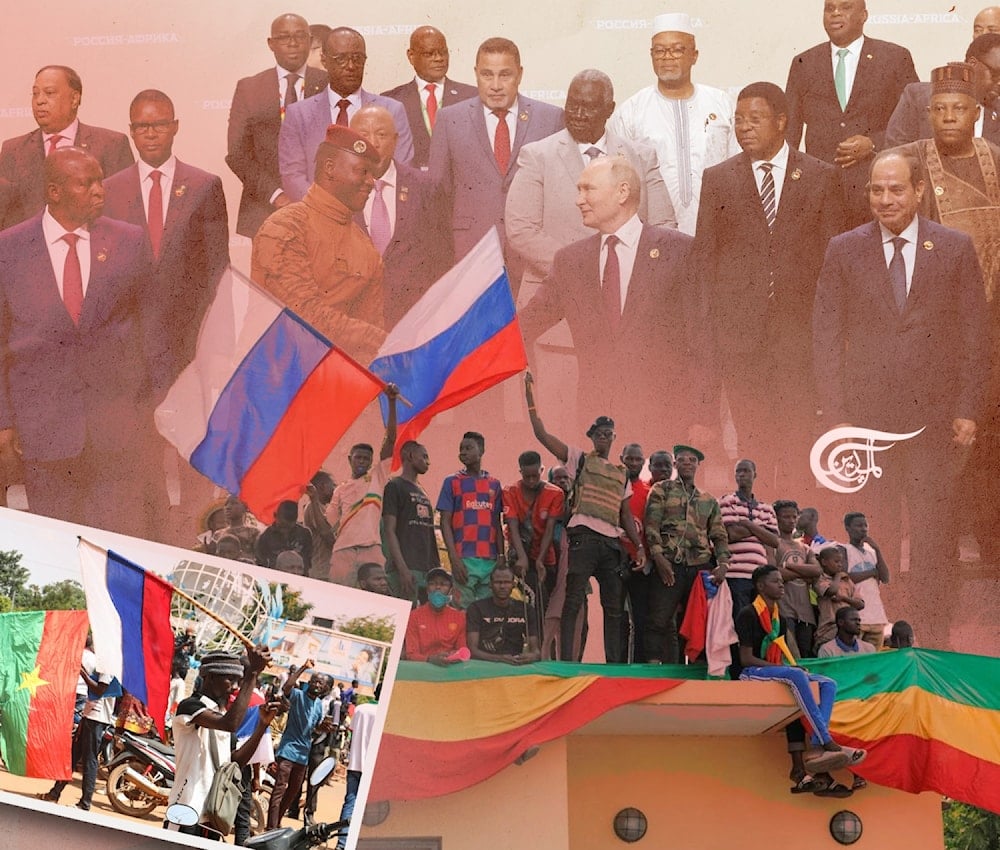Russia in Africa: Strategic Realignment and Open Embracement
African states turn to Russia in 2025, rejecting Western neocolonialism for Moscow’s non-interference, military aid, and resource-based partnerships without political conditions.
-

The Russian approach however, does not involve calls for structural reform or ‘good governance’ which can be perceived as another form of colonial control in Africa (Illustrated by Mahdi Rteil to Al Mayadeen English)
African states whether part of the ‘Francophone’ such as Sierra Leone and Algeria who were victims of colonization or others such as South Africa who have borne the brunt of Dutch settlers imposing apartheid on their populations, have been deprived for improving economic, security and political indicators despite going through processes of decolonization and having sovereign political structures today. Western multinational companies engaging in resource extraction in states such as the Democratic Republic of Congo has only proliferated instability paradoxes in the absence of tangible trickle-down effects on the local population. Also, African resources fueling so called developed or former colonial powers, has only resulted in massive poverty, disillusionment, unemployment, exploitation and conflict across the continent.
In light of this, many states with their unique political economies are turning towards Russia in 2025, marking significant strategic realignment and an open embracement of Moscow’s role as a promoter of prosperity, stability and security on the continent. A variety of variables explain this shift which has occurred in many African states, fed up with Western neocolonialism.
Mature Diplomacy vs Western Conditionalities
Similar to China which adheres to Zhou En Lai’s Five Principles of Peaceful Coexistence as foreign policy, Russia does not believe in regime change operations, tinkering with local political dynamics, monetary coercion or calls for reform in other countries. Instead, it focuses on strategic, meaningful, and long-term cooperation with UN member states, including African countries with their perceived authoritarian regimes. Greater closeness is due to Moscow’s penchant for non-interference and the Putin government’s drive to end neocolonial structures of exploitation which have permeated in states such as the DRC. Russia’s approach can be contrasted with Western cooperative mechanisms which largely ignore domestic dynamics, intertribal rivalries, and the apparent potential from positive economic trajectories and rising GDP growth rates which have been witnessed in African states during turbulent times.
Furthermore, African states have had to deal with Western policymaking such as decoupling, populism and protectionism, and Western financial institutions and aid agencies either falling short on promises or pushing for excruciating structural reforms, contributing to greater financial disillusionment for the average African citizen. Recall that countries in the developing world have endured IMF programs while not witnessing localized prosperity. Instead, more burden has materialized in local institutions, national exchequers, treasuries, and state banks.
The Russian approach, however, does not involve calls for structural reform or ‘good governance’ which can be perceived as another form of colonial control in Africa. It builds on existing economic potential as was the case in April 2025, when Foreign Minister Sergei Lavrov hosted diplomats from Mali, Niger and Burkina Faso to share resource deals. This was met with great approbation from the public in the three countries, where French interference in internal affairs was castigated and Russian diplomacy was lauded as a grassroots-level success story that needs to be appreciated. Similarly, in June 2025, Russia signed agreements with Mali for a nuclear energy cooperation project, geological exploration and gold refinery construction.
Note however, that none of these agreements come with conditionalities such as calls for structural reform, regime change or ensuring ‘good governance’ as a prerequisite for cooperation, but instead calls were aimed at enhancing economic prosperity in African states in an apolitical manner.
Meaningful Military Support through Wagner and Beyond
One of the greatest challenges confronting African states which the continent, particularly Sub-Saharan Africa endured for decades is variegated security quagmires which have damaged the political economy in states. Russia’s Africa Corp or post Wagner Group structures (Wagner PMCs) however, have sought to play constructive roles in diffusing prolonged crises. Wagner PMC has successfully trained local armed forces and engaged in capacity building by providing military advisors amid adequate conflict interventions in different states. This can be contrasted with Western forces constantly retreating and leaving unstable countries such as Niger, CAR, and Sudan to deal with dynamics which pose an existential and seemingly intractable threat.
There is also a non-traditional aspect to security cooperation between Russian and African states which is laudable. Arrangements such as ensuring access to uranium deposits in countries such as Niger, diamonds and gold have materialized. While these ventures are undoubtedly extractive in nature, they do not involve erosion of state sovereignty for recipient states and reflect Moscow’s unequivocal respect for state sovereignty. In Mali, Wagner mercenaries have been deployed to bolster the junta while also granting access to gold-rich regions such as Sikasso and Koulikoro in exchange for provision for adequate security. Similar models have been replicated in the Central African Republic.
This is important for countries such as the CAR which remain one of the most impoverished states in the world. By cooperating with Russia, Bangui has benefited from hundreds of Wagner Group instructors in 2018 and over 1000 troops from Russia by 2019 to support the government from falling and contributing to further political instability which has been witnessed across the continent. Also, Wagner-linked groups such as Lobaye Invest, Bois Rouge and Diamville managed to control gold and diamond deposits as is the case with the Ndassima mine, yielding hundreds of millions on an annual basis which clearly suggests that support regimes has been complimented with economic endeavors.
In North and North East Africa, countries such as Sudan have also benefitted from Russia developing their respective paramilitaries while securing access to the Red Sea which remains an important conduit for global trade. In Libya, Soviet-era ties with former and contemporary regimes has allowed Moscow to provide a logistical conduit which connects North Africa to the Sahel.
All of this is unfolding in an open and transparent manner in the absence of coercion or attempts at tinkering with local dynamics. The Russian approach as demonstrated by trends in 2025 and previously, clearly suggests that direct capacity building, resource for security concessions and infrastructure deals are being promoted in Africa and is being embraced by societies which fed up with neocolonialism and exploitation.

 Hamzah Rifaat
Hamzah Rifaat
 6 Min Read
6 Min Read











